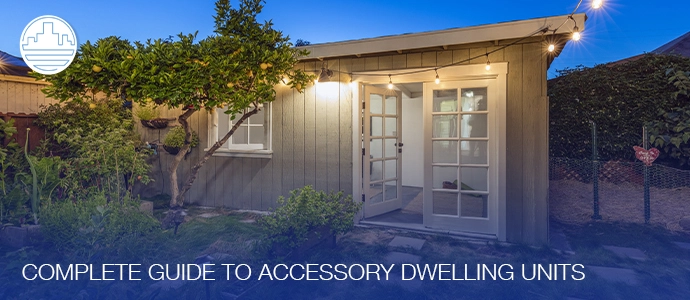
Want to increase your rental income but can’t afford to invest in property? An ADU unit is the right option for you. What is an ADU, you ask? Well, an Accessory Dwelling Unit (ADU) is a second small dwelling located right on the grounds of your regular single-family lot. This ADU unit can be:
- A small, detached house in the backyard
- An attached small living space that extends from your main house
- A basement apartment
- An apartment over your garage
- A garage converted into a small, comfortable living space
Understanding Accessory Dwelling Units
Also known as ‘granny flats’ or ‘mother-in-law units’, ADU homes can be used to house a family member or can be rented out for additional income.
Accessory Dwelling Unit plans:
While ADUs may be attached or detached from a house, they usually use the electrical and water connections from the primary house. Governed by different zoning rules and regulations, ADU homes have a type, size, design, and style limit levied on them depending on which state you reside in. Also, it is mandatory for the owner of the primary house to live on the property.
What Are Accessory Dwelling Units’ Legal Requirements:
In many localities, you can get legal rental income from ADU housing. The following points describe the legal requirements for a structure to be classified as an ADU:
- Only one ADU unit is allowed on the land parcel of a primary single-unit dwelling.
- The ADU building must be smaller in size than the primary unit.
- The Accessory Dwelling Unit must have a separate entry/exit, sleeping area, functioning kitchen, and bathroom facilities.
- The ADU should also have fire detectors, water sprinklers, and carbon monoxide detectors.
Legally, since an ADU is a part of the same property as the primary home, it cannot be sold or bought separately. The owner of the primary home remains the owner of the ADU.
ADU Development Standards:
The development standards for ADUs vary from state to state and even city to city. While some local zoning laws limit the size of the ADU to under 500 square feet, there are others that allow the size to go up to 1,000 square feet. Depending upon the city/state, ADU height, width, and length restrictions are also applicable.
In some cities, ADU development standards are also applicable to the lot. While the zoning laws in some cities require the land parcel to be at least 3,200 square feet, there are others that don’t have any specifications about the lot size. Once again, it all boils down to the building codes and the state and local laws.
Accessory Dwelling Unit Pros & Cons:
Before you reach out to ADU builders to start constructing on your property, here are a few pros and cons you should consider:
PROS:
- Extra income! No matter whether you’ll host a full-time resident or use your ADU as a vacation rental (part-time renter), it’s a great source of extra income.
- If you decide to sell your property, an ADU will definitely add value to your home, especially in housing markets having limited affordable housing.
- An ADU gives you more usable space. As mentioned earlier, you can either rent it out or you can use it as a guest suite/ home office/ permanent home for an elderly family member or adult children, etc.
CONS:
There are no cons per say! But you do need to take the construction cost and the interior designing expenses into consideration.
Choose Beach Front Property Management To Increase Your ROI
An ADU is an excellent way to grow your rental income. If your necessities are bare minimum and if you enjoy a minimalist lifestyle, you can even rent out your primary dwelling and live in the ADU yourself! That would definitely provide a lot of flexibility to your finances. To figure out the best rental amount you can earn from your ADU, you can reach out to Beach Front Property Management. We not only evaluate the market to suggest the best rental rates, but also provide services such as property inspection and reviewing rental policies. To do it the right way, check our website or talk to our consultants at BFPM.
Before you start building your Accessory Dwelling Unit, it will be beneficial if you consult your local housing and community development administration. They can give you a detailed idea of the zoning rules and regulations in your area. In fact, you can even consult an expert local contractor who knows all the local zoning requirements and laws for ADUs.
Learn more about how we can help. Customized solutions for large portfolios!
